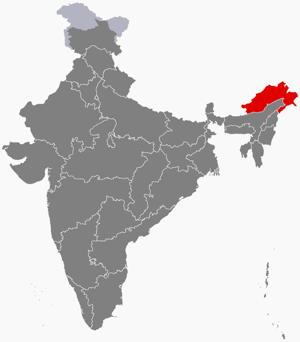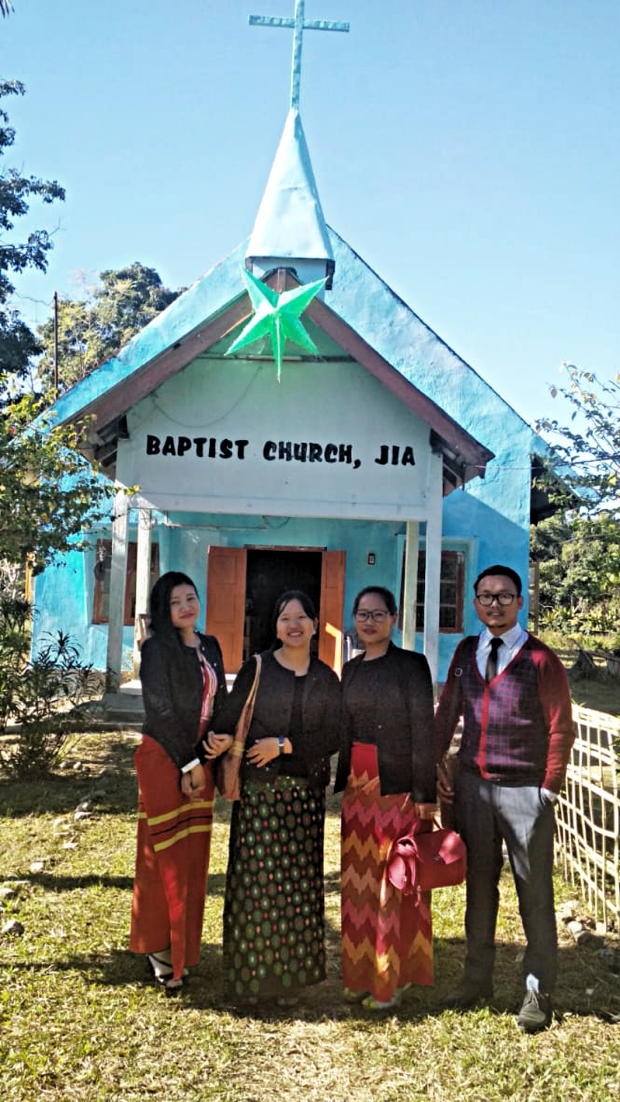
Photo: A view from Bhalukpong, a small town by the southern reaches of the Himalayas.
Welcome, Apilang! Tell us a little about your background and how you became a Christian.
 I belong to the Adi tribe, a major tribe in Arunachal Pradesh, India. (Arunachal Pradesh is one of the 29 states of India and is the northeasternmost state of the country, sharing international borders with Bhutan, Myanmar, and China). My family consists of my mother, my elder sister and myself. My sister is married and is mother to four beautiful children.
I belong to the Adi tribe, a major tribe in Arunachal Pradesh, India. (Arunachal Pradesh is one of the 29 states of India and is the northeasternmost state of the country, sharing international borders with Bhutan, Myanmar, and China). My family consists of my mother, my elder sister and myself. My sister is married and is mother to four beautiful children.
When I was in my first year of undergraduate in the year 2008, a friend invited me to take part in an evangelistic camp which was organized by Jawaharlal Nehru College Evangelical Union. Evangelical Union is a part of Union of Evangelical Students of India (UESI), InterVarsity’s sister movement in India. I was reluctant to go at first, but it was a holiday. I decided to attend the camp without an inkling that the camp would change my life forever.
You are both a student and a teacher. What do you teach and study? What motivated you to be interested in your field?
I teach Economics to undergraduate students in Jomin Tayeng Government Model Degree College Roing in Arunachal Pradesh. It is a state government-run college. I am also pursuing a PhD in Economics at Rajiv Gandhi University, Itanagar (the state capital). I am doing an economic analysis of child labour in Arunachal Pradesh. I am studying the role of children in the household economy, particularly in remote rural areas which are often neglected and given less attention. Older children often take care of their younger siblings so that the parents are free to do their work. Those who go to school take care of their younger siblings after school is over and also help their parents in collecting firewood from the jungle. In more developed areas, richer or middle-income families employ children, particularly the children of labourers from the Tea Estates in Assam (the neighboring state) to take care of their children and to do household activities like cleaning utensils and washing clothes. Mostly the children who are engaged in paid work are not from my state but they are from neighboring states like Assam and Bihar. They are mostly street vendors, or they work in hotels, restaurants, car garage, and car wash centre.
My final analysis is not completed and therefore, I can't give the exact figure of the income contributed by the child in the household economy, but we see that it is significant.
Knowing that my ordinary work matters to God, I cannot live a mediocre life. It is the greatest motivation that pushes me to strive for excellence in my field.
What brings you joy in your work? What are some difficulties?
I want to start with the difficulties. My state, Arunachal Pradesh, is one of the least-developed states in India. Even the literacy rate is the second lowest (66% ) in the country. There are lots of challenges for us to catch up with mainstream India in terms of education — forget about meeting international levels. My college is located in a village. Therefore, the majority of the students are from low-income families with a very poor educational background. Given the pitiful conditions of the government schools in my state, it is not surprising that the students are weak in their studies. I believe they do have the potential to excel, but they are not willing to work hard. The biggest challenge for me as a teacher is to make them understand the importance of education, of what they are being taught in the college. Many of them are inattentive in and irregular to class. Sometimes, I have to call my students to come to the class. Not being punctual and cheating in the exam are major issues that we teachers have to deal with.
As a teacher, I always celebrate when my students outperform my expectations, raise questions, and do not cheat in the exam. Apart from teaching, I like to discuss the root causes of social problems, politics, and the economy of the state and nation with my students and colleagues. In doing that, I share the Christian vision of society. There cannot be a greater joy than sharing a Christian worldview — an alternative way to look at life and the purpose of living. Without invoking the name of Jesus, I believe I can articulate a Christian vision and values if I am intentional about what I say. I consider my students and colleagues as co-creators of God’s Kingdom whether they are Christians or non-Christians.
Can you tell us how you began to grow in your understanding of the integration of faith and academics? In what ways is this understanding impacting your own work and research?
It was in the year 2015. I attended the Intensive Summer Study (ISS), a two-week programme which was organized by North Delhi Evangelical Graduate Fellowship (EGF) in Manali. What I learned at the camp shook my beliefs in the sacred and secular divide. Since then, I slowly began to understand the importance of integrating faith and academics. Teaching helps me to discover that even the subject that I study needs God’s redemption. God is redeeming the whole creation, and he is inviting us to be a part of his “Redeeming Project.” When I understood this, life became more exciting as it eliminated every tendency to live a mediocre life. Besides, this understanding motivates me to pursue excellence in my profession. I like Dorothy Sayers’ quote which says, “We don’t work to live, but we live to work.”
When I started my PhD, I didn't know much about integrating faith and academics. To be honest, I started my PhD just for the sake of getting a degree. So I did not have a deep interest in my research initially. However, as I began to understand the integration of faith and academics, it changed the way I looked at my research. I started taking my research on the economic role of children seriously. Due to increased costs of education, the tendency is to view children as a burden, but it is not always parents who provide for the children. Even children provide for the parents, especially in rural areas and poor families by contributing a lot to the household finances. Since Christians consider children as God's gifts, I think recognising their economic contribution will help us appreciate them more.
The integration of faith and academics also helped me to take my teaching seriously. Teaching is an opportunity where one can mould and shape young adults who will serve the church, society, and nation in the future. In my two years of teaching, I have realised that ethics is detached from the current education system and I firmly believe that one of the roles of a teacher is to integrate ethics and education. Hence, the need for good Christian faculty in the universities and colleges. Currently the Evangelical Union students of my college come for fellowship at my house every Friday after their class. I also join them in their discussions and I am learning a lot from them. Seeing their passion to learn more about God always motivates me to do better in my vocation. I am learning how to mentor them and the challenge is how best I can do this.

I understand that you are in the UESI alumni leadership team in your region. Can you tell us what the UESI graduates are doing in your region and how you are involved?
Yes, I am a part of UESI in my area. Currently, I am the President of Evangelical Graduate Fellowship (EGF) of Roing. As a graduate, I am trying to help my students and other friends to live a coherent life by connecting their beliefs and behaviors. We have a few graduates who are actively and sacrificially involved in the ministry. We are trying to help the students to grow in Christ by teaching them how to study the Bible. Many of us are also actively involved in the local churches. Some of our UESI graduates maintain integrity in the workplace.
I was among the first in the university community of my state who were exposed to the idea of integrating faith and academics, so I faced many challenges in sharing this insight with others. With my efforts, we started a book study group in the University three years back. We meet twice in a month. We read books by several authors including N.T. Wright and Christopher Wright. Currently we are reading The Fabric of Faithfulness by Steven Garber.
It was difficult for me to introduce book-reading habits to my friends. Unlike western countries, we don't have reading habits cultivated from childhood (except a very few). Here people are not interested in reading books. People are interested only in classroom textbooks and they don't see beyond that.
The majority of the students are not interested in doing hard work and the aim in their life is just to get a secure government job. In between the period of graduation and getting a job, many graduates stop coming to church and Bible study because of their frustration. The unemployment rate is high here.
I think understanding that God wants us to integrate our faith and academics so that we can help build a society that reflects his kingdom can motivate us and encourage us to excel in our given field. But it is still a challenge to help people understand this.
What challenges do you experience as a single, female graduate student (in university and in society)?
I have not experienced any major challenge as a single female graduate in the university and at my workplace. It may be because all my colleagues are lovely people who are always cooperative and ready to help whenever someone is in need of assistance. As far as the society is concerned, I get tired of responding to their question: “When are you getting married?” Our community is still conservative. They do not encourage singleness.
What insights can you share with us about living as a first-generation Christian?
As per my experience as a first-generation Christian, it is not easy to practise Christianity at the initial stage. The challenges are different at home, and in Christian growth .
At home — I belong to a family who believes in an animistic religion. My mother performs various rituals to appease the deities for our health. My late father hated Christianity. He often felt insecure about my life after I embraced Christianity. He did not like my conversion, however, he did not scold me because I was the one who he loved the most in the family. But there was always a tension between my beliefs and my family’s beliefs. The tension still exists. It is not an easy environment.
In Christian growth — As first-generation Christians with no Christian upbringing, it is a challenge for us to practise our beliefs. Without any biblical background knowledge, it takes extra effort for us to read and learn the Bible. At the initial stage of our faith, we need extra care from the elders who can nurture and help us to grow more in Christ.
Thank you for sharing your story with us, Apilang! It's a delight to get to know you better.